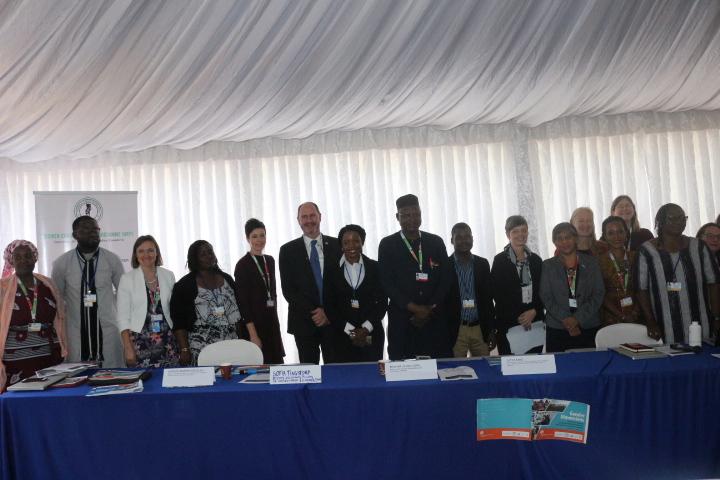Nigeria’s Minister of State for Environment, Ibrahim Usman Jibril, has pledged to make gender issues a priority in chemicals and waste management in the country.

He made the pledge at a side event on gender, chemicals and waste, held on the second day of the 3rd session of the United Nations Environment Assembly (UNEA 3), in Nairobi, Kenya on Tuesday, December 5, 2017.
The side event, titled: “What has gender got to do with chemicals?”, was organised by Women Engage for a Common Future (WECF) in collaboration with Women Environmental Programme (WEP), Balifokus Foundation, Women’s Major Group and International Pesticide Elimination Network (IPEN), with support from the Secretariat of the Basel, Rotterdam and Stockholm (BRS) Conventions.
The side event premiered a film based on the scoping study on gender dimensions of chemicals and wastes policies under the BRS Conventions in Nigeria and Indonesia.
The scoping study aimed to understand:
- How are women and men differently impacted in their health by Persistent Organic Pollutants (POPs), hazardous chemicals and waste?
- How do women and men’s occupations and their roles at home and at work influence exposure to POPs, hazardous chemicals and waste?
- What best practices with women and men’s leadership exist to substitute and eliminate POPs, hazardous chemicals and waste?
Presenting the result of the scoping study in Nigeria, Dr. Priscilla Achakpa of WEP said that the scoping study was conducted in January and February, 2017 in Lagos and Abuja, and included interviews and focus group discussions with relevant government ministries and agencies, waste management companies, scientists, media and civil society, a multi-stakeholder meeting and literature review.
Findings from the scoping study, she said, showed that there is high level of exposure to POPs and other harzadous chemicals whose major sources are from imported electrical and electronics equipment, pesticides, burning of municipal and plastic wastes and informal recycling. The study, she added, found that the human breast milk samples obtained from volunteer-mothers at Maitama Hospital showed high levels of chlordane, dieldrin, DDT, toxaphene, PCBs, hexabromocyclododecane (HBCD), hexachlorocyclohexane (HCH), and perfluorooctanesulfonate (PFOS).
Another shocking finding from the study was that PCB oil (Polychlorinated byphenyls), a liquid used in electrical transformers as a coolant, is used as cooking oil by some women. These, she said, are found to be the causes of genetic disorders, delayed pregnancy, birth defects, male infertility and other deleterious health conditions.
Although recognising that the Federal Government of Nigeria has taken steps to address exposure to POPs and other harzadous chemicals by women through her updated Implementation Plan of the Stockholm Convention on Persistent Organic Pollutants by sensitising women on practices that could lead to exposure to POPs, Dr. Achakpa recommended in addition that the government should:
- Implement Extended Producer Responsibility policies
- Find alternative to chemical pesticides and insecticides
- Improve waste management through deployment of appropriate technologies, improvement in waste management infrastructure and capacity building of waste management personnel.
- Increase inter-sectoral coordination on chemicals and wastes including its gender dimensions
- Increase law enforcement of chemicals and wastes management regulations
- Design and implement programmes that will promote recycling of plastics and discourage open burning of wastes.
She concluded that exposure to chemicals has deleterious effects on human health and the environment and given the biological composition of women and children, exposure to chemicals affect them seriously. She called for a strong commitment from government to address the pollution of environment by chemicals if it must achieve the Sustainable Development Goals (SDGs).
Speaking at the event, Jibril applauded the scoping study and stated the readiness of the ministry to discuss with relevant stakeholders to ensure that the recommendations of the study are implemented to address the findings in the report.
The ministry, he said, would make gender issues a priority in designing and implementing chemicals and waste management projects and programmes. He stated that he learnt so much from the former Minister of Environment, Amina J. Mohammed, who inculcated in him the consciousness about gender.
According to him, the former Minister of Environment would always say that gender issues could be likened to a bird that cannot fly on one wing, unless it uses two wings; and so development cannot be sustainable unless different categories of people are involved and their needs taken into consideration in the planning and implementation of programmes.
The Minister of State for Environment appreciated the Secretariat of the BRS Conventions for making gender issues central to the work of the Secretariat and pledged that Nigeria, as a Signatory to these Conventions, would follow the same track.
The scoping study is part of the activities of the Secretariat of the BRS Conventions based on its Gender Action Plan that was developed in 2013 and aims to ensure that principles of gender equality are firmly embedded in the activities undertaken by the BRS Secretariat.
The scoping study was conducted by WECF in collaboration with WEP and Balifokus Foundation, with support from BRS Secretariat.
By John Baaki Terzungwe, Nairobi, Kenya
